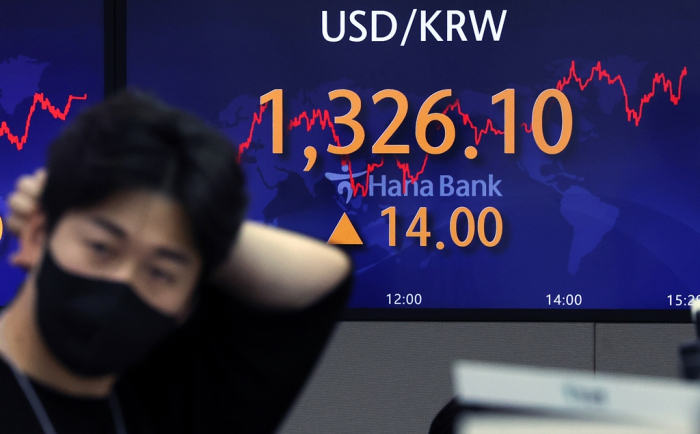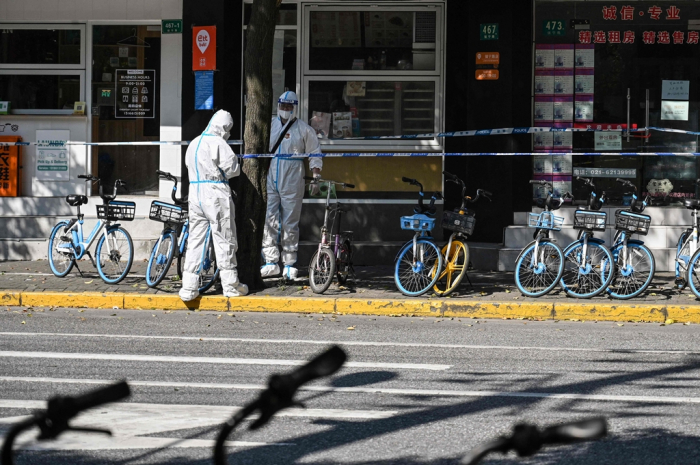Foreign exchange
Won may head to 1,400 against the dollar for 1st time since 2008-09 crisis
The South Korean currency is further pressured by looming interest rate discount, China slowdown, Europe risks
By Jul 15, 2022 (Gmt+09:00)
3
Min read
Most Read
LG Chem to sell water filter business to Glenwood PE for $692 million


Kyobo Life poised to buy Japan’s SBI Group-owned savings bank


KT&G eyes overseas M&A after rejecting activist fund's offer


StockX in merger talks with Naver’s online reseller Kream


Mirae Asset to be named Korea Post’s core real estate fund operator



The South Korean won is expected to weaken to 1,400 against the dollar, a level not seen since the 2008-09 global financial crisis as the country’s interest rate premium over the US is expected to become a discount.
China’s economy, South Korea’s top overseas market, also sharply slowed, adding to concerns that Asia’s fourth-largest economy will keep suffering from a trade deficit.
The won on Friday depreciated as much as 1.1% to 1,326.7 per dollar in the domestic currency market, the weakest since April 29, 2009. Local foreign exchange authorities were spotted selling dollars to support the won, but it failed to help the ailing currency recover earlier losses, traders said.
The local unit is likely to head to 1,400 versus the US currency, a level last seen in March 2009, currency market participants said.
INTEREST RATE DISCOUNT
That came as South Korea’s interest rates are expected to be lower than those of the US. Producer prices in the world’s largest economy surged 11.3% last month from a year earlier, the highest reading since the record 11.6% in March, data showed on Thursday. Consumer prices also soared 9.1% in June, the fastest pace in 41 years.
Such rampant inflation added to expectations that the US Federal Reserve will increase the target federal fund rate by 75 basis points to a range between 2.25% and 2.5% later this month.
That compared with South Korea’s policy interest rate of 2.25%. The Bank of Korea on Wednesday took the most aggressive measure with a 50-bp policy interest rate hike for the first time in its history.
Higher US interest rates are predicted to spur capital outflows more. Foreigners already turned net sellers in South Korea’s bonds for the first time in 18 months last month while continuing to dump their stocks for a sixth straight month.
SLOWING CHINA
The won’s weakness accelerated after data showed China's economy grew only 0.4% in the second quarter from a year ago as lockdowns in major cities to curb the COVID-19 hurt Asia’s top economy. The country’s property market is also sluggish, raising fears that the country’s economic growth may fall short of 4% this year.

The slump is expected to hurt the South Korean economy. The country already suffered the largest trade deficit for the first half of a year in the January-June 2022 period. The trade account against China turned to a deficit for the first time in 28 years.
If China’s economic growth falls by 1 percentage point, South Korean exports increase is likely to decline by 0.34 percentage point, the BOK estimates. But the central bank sees more risks.
“A prolonged slowdown in China’s economy will not only cut South Korea’s exports to China but also hurt growth in the European Union and other Asian economies that heavily rely on trades with China. That will also affect the domestic economy,” it said.
In Europe, concerns already increased over possible energy and debt crisis, which hurt the won currency further.
“It is a basic assumption that the won will weaken to 1,370 per dollar on factors such as slowing exports,” said Moon Hong-cheol, an economist at DB Financial Investment. “The currency could depreciate to the 1,400 level, given additional economic risks including a eurozone fiscal crisis and potential shocks in property markets at home and abroad.”
Write to Mi-Hyun Jo at mwise@hankyung.com
Jongwoo Cheon edited this article.
More to Read
-
 Central bankBOK delivers first-ever 50-bp hike to curb inflation
Central bankBOK delivers first-ever 50-bp hike to curb inflationJul 13, 2022 (Gmt+09:00)
3 Min read -
 MarketsSell Korea intensifies as foreigners dump bonds for 1st time in 18 months
MarketsSell Korea intensifies as foreigners dump bonds for 1st time in 18 monthsJul 11, 2022 (Gmt+09:00)
3 Min read -
 EconomyKorea sees record H1 trade deficit, weak consumer sentiment
EconomyKorea sees record H1 trade deficit, weak consumer sentimentJul 01, 2022 (Gmt+09:00)
5 Min read
Comment 0
LOG IN


